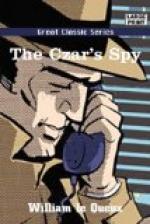“Trust in me,” I scribbled quickly. “I will act upon any suggestion you make. Have you any female friend in whom you could trust to hide you until this danger is past?”
“There is one friend—a true friend. Will you take a note to her?” she wrote, to which I instantly nodded in the affirmative.
Then rising, she obtained some ink and pen and wrote a letter, the contents of which she did not show me before she sealed it. I sat watching her beautiful head bent beneath the shaded lamplight, catching her profile and noticing how eminently handsome it was, superb and unblemished in her youthful womanhood.
I watched her write the superscription upon the envelope: “Madame Olga Stassulevitch, modiste, Scredni Prospect, 231, Vasili Ostroff.” I knew that the district was on the opposite side of the city, close to the Little Neva.
“Take a drosky at once, see her, and await a reply. In the meantime, I will prepare to be ready when you return,” she wrote. “If Olga is not at home, ask to see the Red Priest—in Russian, ‘Krasny-pastor.’ Return quickly, as I fear Woodroffe may come back. If so, I am lost.”
I assured her I would not lose a single instant, and five minutes later I was tearing down the Morskaya in a drosky along the canal and across the Nicholas Bridge to the address upon the envelope.
The house was, I found, somewhat smaller than its neighbors, but not let out in flats as the others. Upon the door was a large brass plate bearing the name, “Olga Stassulevitch: modes.” I pressed the electric button, and in answer a tall, clean-shaven Russian servant opened the door.
“Madame is not at home,” was his brief reply to my inquiry.
“Then I will see the Red Priest,” I said in a lower tone. “I come from Elma Heath.” Thereupon, without further word, the man admitted me into the long, dark hall and closed the door with an apology that the gas was not lighted. But striking a match he led me up the broad staircase and into a small, cosy, well-furnished room on the second floor, evidently the sitting-room of some studious person, judging from the books and critical reviews lying about.
For a few minutes I waited there, until the door reopened, and there entered a man of medium height, with a shock of long snow-white hair and almost patriarchal beard, whose dark eyes that age had dimmed flashed out at me with a look of curious inquiry, and whose movements were those of a person not quite at his ease.
“I have called on behalf of Mademoiselle Elma Heath, to give this letter to Madame Stassulevitch, or if she is absent to place it in the hands of the Red Priest,” I explained in my best Russian.
“Very well, sir,” the old man responded in quite good English. “I am the person you seek,” and taking the letter he opened it and read it through.
I saw by the expression on his furrowed face that its contents caused him the utmost consternation. His countenance, already pale, blanched to the lips, while in his eyes there shot a fire of quick apprehension. The thin, almost transparent hand holding the letter trembled visibly.




